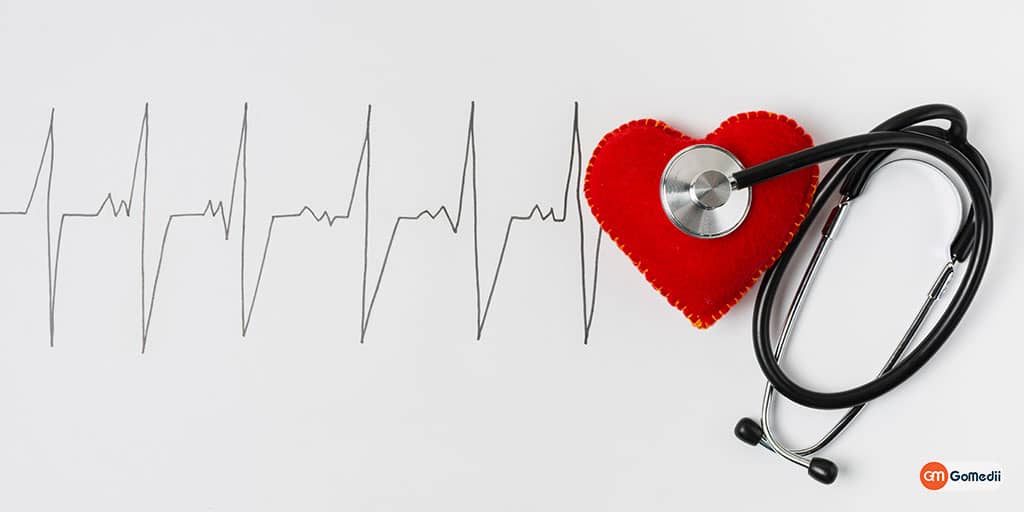Atrial fibrillation is also called AFib or AF. It is an uncommon heartbeat which can lead to blood clots, stroke, heart failure, and other heart-related complications. It is advised to not ignore any symptoms indicating this problem and consult a cardiologist for the best treatment. Today we are going to discuss this and how it can be treated.
(People Also Like To Read:Wheezing : Symptoms, Causes, Risk and Treatment)
What is Atrial Fibrillation?
It is an uneven and frequently rapid heart rate which can increase the risk of stroke, heart failure, and other heart-related complications. Through atrial fibrillation, the heart’s two upper chambers beat chaotically and irregularly out of coordination with the two lower chambers of the heart.
This disease can come and go. Although it isn’t life-threatening, it is a serious medical condition that sometimes requires emergency treatment.
What are the Types of Atrial Fibrillation?
There are mainly 8 types, they are mentioned below:
1. Paroxysmal
2. Persistent
3. Long-Standing Persistent
4. Permanent
5. Valvular
6. Nonvalvular
7. Acute Onset
8. Postoperative
What are the Symptoms of Atrial Fibrillation?
There are a few symptoms of Atrial Fibrillation used to recognize the condition:
1. A flip-flopping in your chest
2. Weakness
3. Reduced ability to exercise
4. Fatigue
5. Lightheadedness
4. Dizziness
5. Confusion
7. Chest pain
What are the Risk Factors of Atrial Fibrillation?
Age
The older you are, the greater the risk of developing atrial fibrillation.
Heart disease
Anyone with heart diseases like – heart valve problems, congenital heart disease, congestive heart failure, coronary artery disease, or a history of heart attack or heart surgery have an increased the risk of atrial fibrillation.
High blood pressure
Having high blood pressure, especially if it’s not well-controlled with lifestyle changes or medications, can increase the risk of atrial fibrillation.
Other chronic conditions
Some people with long term conditions like – thyroid problems, sleep apnea, metabolic syndrome, diabetes, chronic kidney disease or lung disease have an increased risk of atrial fibrillation.
Drinking alcohol
For a few people, drinking alcohol can trigger an episode of atrial fibrillation. Excessive drinking may put you at an even higher risk.
Obesity
People who are overweight are at higher risk of developing atrial fibrillation.
Family history
The family hierarchy or history may increase the certain risk of this condition.
What are the Complications of Atrial Fibrillation?
Stroke
In this, the chaotic rhythm may cause blood to pool in your heart’s upper chambers (atria) and form clots. If a blood clot forms, it could move from your heart to your brain. It might block blood flow, causing a stroke.
The risk of a stroke in atrial fibrillation depends on your age and on whether you have high blood pressure, diabetes, a history of heart failure or previous stroke, and other factors. Some medications, like blood thinners, can greatly lower your risk of a stroke or the damage to other organs caused by blood clots.
Heart Failure:
If atrial fibrillation is not controlled, it may weaken the heart and lead to heart failure, a condition in which your heart can’t circulate enough blood to meet your body’s needs.
(You Might Also Like To Read:Hypotension (Low Blood Pressure) : Causes & Treatments)
What are the Preventions of Atrial Fibrillation?
- Eating a heart-healthy diet
- Increasing your physical activity
- Maintaining a healthy weight
- Limiting or avoiding caffeine and alcohol
- Lower stress, as intense stress and anger can cause heart rhythm problems
- Using medications with caution, as some cold and cough medications contain stimulants that may trigger a rapid heartbeat.
How to Treat Atrial Fibrillation?
The treatment of this disease is most appropriate. It depends on how long you’ve had this, how bothersome your symptoms are and the underlying cause of your problem. Usually, the treatment goals for the situation are to:
Resetting the Heart’s Rhythm:
Preferably, to treat atrial fibrillation, the heart rate and rhythm are reset to normal. Maintain the condition, doctors may be able to reset the heart to its regular rhythm (sinus rhythm) using a procedure called cardioversion, depending on the underlying cause of atrial fibrillation and how long you’ve had it.
Cardioversion can be Conducted in Two Ways:
Electrical Cardioversion:
In this overall procedure, an electrical shock is delivered to your heart through paddles or patches placed on your chest. The shock stops your heart’s electrical activity momentarily.
When your heart begins again, the hope is that it resumes its normal rhythm. The procedure is performed during sedation, so you shouldn’t feel the electric shock. The doctor may give you medications to help restore normal sinus rhythm (antiarrhythmics) prior to the procedure.
Cardioversion with Drugs
This form of cardioversion uses medications called antiarrhythmics to help to restore normal sinus rhythm. Depends on your heart condition, the doctor may suggest trying intravenous or oral medications to return your heart to normal rhythm.
Maintaining a Normal Heart Rhythm
After electrical cardioversion, your doctor may prescribe anti-arrhythmic medications to help prevent future episodes of atrial fibrillation. Medications may include:
- Dofetilide (Tikosyn)
- Flecainide
- Propafenone (Rythmol)
- Amiodarone (Cordarone, Pacerone)
- Sotalol (Betapace, Sorine)
Although these drugs may help maintain normal heart rhythm, they can cause side effects, including:
- Nausea
- Dizziness
Conclusion:
In the above article, we have discussed atrial fibrillation and its types, symptoms, causes, risk factors and more importantly the treatment. The only way to control this problem is to take proper rest and medications on time if it won’t help, consult a professional doctor as soon as possible to avoid future complications.
(People Also Like To Read:Heart failure Symptoms: You Should Know About It!)
About GoMedii: GoMedii is a Healthcare Technology Platform That Works Out Your Treatment / Surgery the Way You Need & Plan. A Treatment partner that simplifies the patient journey at every step. Drop Your Queries for the most affordable & world-class treatment options.You may simply download the GoMedii app for Android or iOS.
